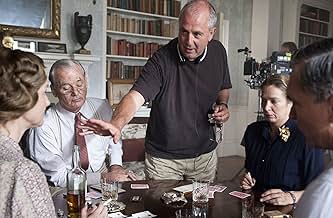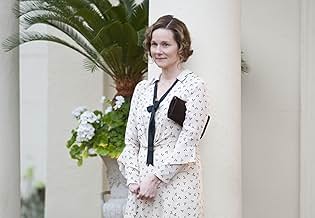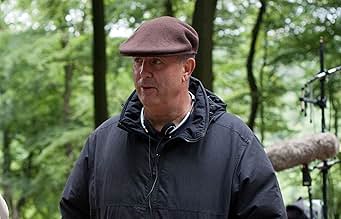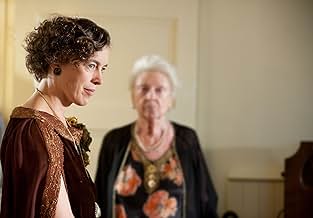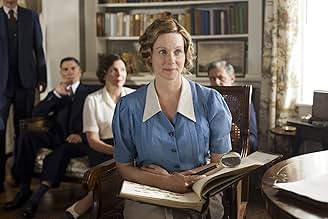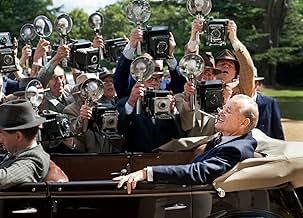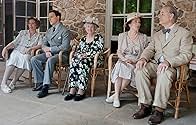La historia de la relación amorosa entre Franklin Roosevelt y su prima lejana Margaret Suckley, centrada en el fin de semana de 1939 en que los Reyes del Reino Unido visitaron el estado de N... Leer todoLa historia de la relación amorosa entre Franklin Roosevelt y su prima lejana Margaret Suckley, centrada en el fin de semana de 1939 en que los Reyes del Reino Unido visitaron el estado de Nueva York.La historia de la relación amorosa entre Franklin Roosevelt y su prima lejana Margaret Suckley, centrada en el fin de semana de 1939 en que los Reyes del Reino Unido visitaron el estado de Nueva York.
- Dirección
- Guionista
- Elenco
- Premios
- 1 premio ganado y 5 nominaciones en total
- Dirección
- Guionista
- Todo el elenco y el equipo
- Producción, taquilla y más en IMDbPro
Opiniones destacadas
Taking in place in 1939 prior the U.S. committing to what would become World War II, "Hudson" is a film mostly content with being pretty, excited by putting actors in period clothes who pretend to be world leaders. None of these performances are bad, (quite the opposite in fact) but the little piece of history they're reenacting lacks any bit of import.
Bill Murray as Franklin Roosevelt isn't even the center of the film. Instead it's our narrator, Daisy (Laura Linney), FDR's distant cousin, whose diary and memoirs Richard Nelson used to craft the screenplay. She relays a story of romance, but one that's modest and presumed, occurring up to and during the arrival of King George VI and Queen Elizabeth from England to Hyde Park on Hudson, home of FDR's mother and his home away from Washington.
The film invests a lot in presenting FDR in such a casual manner, but this notion of candid access is hardly thrilling, either because the man has been dead for almost 70 years, or because it barely shows him in the context of being president — just a man who people treat with great respect and admiration who is surrounded by a lot of people all the time. Any American who studied the president in school knows about his polio and how he was able to keep the country oblivious to it with cooperation from the press, so that's hardly a hook either.
Murray is certainly an unusual but inspired choice. Playing a light-hearted and relaxed FDR makes sense for him, though if tested it would be wrong to doubt his capability to command attention in the role. The film doesn't seem too interested in digging into his psyche, just peeling back the curtain enough to show a man who longed for the affections of women and whose outlook and world view was different from other people in positions of power during his time.
Linney is such a wasted talent as the meek and naive Daisy. Although she narrates throughout, she disappears in stretches, even after the script establishes very clearly that this is her story. She doesn't factor into the conflict until late, and that's if you can consider it conflict. Normally, choosing not to embellish the details of an alleged affair in melodramatic Hollywood fashion would be worthy of much commendation, but the details of their relationship are so vague and the process by which Daisy comes to have feelings for FDR and vice-versa so ambiguous that you feel nothing toward either of them.
The arrival of King George VI (Samuel West) and Queen Elizabeth (Olivia Colman) in Hyde Park provides the film a pair of interesting characters and ultimately something to happen in what would otherwise be a purposeless portrait of a president and his sometimes-lover cousin. George has just assumed power after his brother abdicated the throne and they come to America desperate to forge a partnership between England and the U.S.
Therein could be the conflict at the heart of "Hudson," but the film maintains its light and often jocular tone instead, despite a footnote suggesting the events depicted were crucial to the special relationship between the countries. In essence, much stock is put into the symbol of King George biting into a hot dog.
"Hyde Park on Hudson" is a pleasant film, but it presumes to be interesting on the basis that it depicts famous political figures and exposes a beloved president's unflattering personal life. Maybe that's an exaggerated assumption of the film's intent, but it doesn't tell a story of any kind as far as plot structure goes. It's a great advertisement for a film audiences would prefer to see about who FDR really was, but in and of itself, it fails to offer any acute insight.
~Steven C
Thanks for reading! Visit moviemusereviews.com for more
It (primarily) recounts the events of a weekend in June 1939 in upstate New York when the sitting -- this wasn't typed as a pun -- US president Franklin D. Roosevelt (Bill Murray -- Rushmore, Lost in Translation) welcomes the British King and Queen to his country estate. It was notable because a reigning British monarch had never visited America before and England was on the verge of war with Germany. Also in abundance at the estate -- meddling women ... be it mother, wife, secretary or mistress.
Laura Linney (Primal Fear, Kinsey) plays Daisy -- a distant cousin to FDR -- who is sent-for to help with FDR's wandering mind and calm him. Over time (the film spans more than a weekend), they become rather close and form another type of kinship. The story is told through Daisy which means we hear lots of narration and are given many snippets of time passing before the weekend (to see them develop a relationship -- which an audience never really does) until the monarchs arrive and it becomes ALL about the weekend.
There are plenty of decent moments in Hyde Park on Hudson including Murray as FDR and some wonderful shots of beautiful country landscapes. The film looks nice and the period detail will win some over; but the film fails to ever make a connection with Daisy. As the central character, the audience is given no real reason to want to follow her ... why is she really even here? I don't want to call her bland but the film gives us no reason to believe otherwise and absolutely no real reason as to why her and FDR forged their bond.
I appreciated the depictions of the King and Queen (this is the stuttering king Colin Firth won an Oscar for playing a few years ago and Olivia Colman is quite good as the uncomfortable queen) and their struggles with being in America such as their trying to fathom the "rage" about hot dogs.
Sadly, most of the rest of the film is empty -- like the Hyde Park estate would be when FDR returned to Washington. This should have been so much more ...
In 2004 he was honored with his first Academy Award nomination for his outstanding performance in Lost In Translation for which he was visibly disappointed that he was the recipient. 9 years later he just may be poised for his second Oscar nomination for his unbelievable portrayal of former president Franklin D. Roosevelt. A most unlikely choice on the film maker behalf, but one that will prove to be a proud choice. The film is Hyde Park On Hudson with whom he co-stars along side the always great Laura Linney.
The story is one of an affair the president had with an extremely distant cousin that carried on for years when he would retreat to Hyde Park, NY of which he was quite fond of doing much of his work from there. During the early stages of the affair a monumental occasion occurred when the new king of England became the first king to visit American soil in history. King George VI affectionately known as Bertie, who was recently portrayed by Academy Award winner Colin Firth in The Kings Speech, was very new to his position and felt it best to visit the US and the president to keep up relations. Over a weekend in Hyde Park the king and president formed a very special relationship that proved vital as WWII would shortly break out a few weeks later.
What is most intriguing was that you had to fine men in positions of great power that at the same time had great flaws, Bertie with his stutter and Roosevelt with his partial paralysis. The film has a fine moment when the two converse late one night and the president clearly seems to instill a great confidence in the king when they both realize many similarities in each other.
Over the same weekend the president's affair with his cousin, Daisy quickly becomes threatened and almost comes to a complete halt.
The film is a fine story and well told but it's not without rhythmic issues and has several slow moments. It is without question carried on the shoulders of Murray's performance. It's not a story that has you drawn in within seconds and has some difficulty keeping you there. It is though a good movie that deserves to be soon for Murray alone.
Murray shows the often unknown and unseen humorous side the president Roosevelt and does it with great perfection. His portrayal is one of the great performances of a historical figure in recent years. The one flaw in his award chances may be he happens to be against another fine actor playing an iconic president in Daniel Day-Lewis in Lincoln. It's a story every years where a deserving actor comes away empty handed because someone just happens to be on another level.
Murray's day will come at some point. His commitment to taking great roles and being someone different every time only proves that. Unfortunately we will have to wait a little longer. Loveyourmovies.com
The movie takes place in the summer of 1939, when Franklin Roosevelt (Bill Murray) was spending some time at his country estate at Hyde Park. The movie deals with two events that took place that summer. First was FDR's intimate relationship with Margaret "Daisy" Stuckley (Laura Linney), his sixth cousin, who would become his mistress. The details of their relationship take place in long shots and quiet passages of dialogue that seem muted as if they simply don't have anything to say to one another. The heat in their attraction comes from their mutual admiration over – get this – his stamp collection. How he used this as an aphrodisiac to attract women is a question the movie doesn't really know how to answer, all you can deduce is that intimacy that grows out of admiration over stamps is about as exciting as it sounds.
The other story deals with a visit to Hyde Park by King George VI (Samuel West) and Queen Elizabeth (Olivia Coleman). No British monarch had ever visited America before. They are the pillars of England at a moment when Hitler is about to steamroll over much of Europe, and his Majesty has come west to speak with The President about an alliance that would overthrow the Fuehrer. Yet the movie leaves that important issue around the edges of the movie. Except for one effective scene between The President and The King, in which they both understand that they have physical ailments that they are trying to hide (one is disabled by polio, and the other has a stuttering problem), the movie has no real interest in their relationship. It is understood that America came to Britain's aid and the story of the king and queen is mostly concentrated on their puzzlement with brutish American customs, not just the aforementioned hot dogs, but the picnic and the Native American dancers that will be performing therein.
The story of the king and queen doesn't work because it doesn't move beyond their initial shock over American customs. The story of FDR's infidelity doesn't work because we simply don't care. Part of the problem is Daisy herself. She is our point of view in the film but she's such a blank slate that we have no foothold in her story. Laura Linney is a fine actress but she stands at a distance from FDR, admiring him but hardly saying a word except in narration. That narration, by the way, is so lazy, quiet and tired that it comes off like a particularly dull audio book. Roosevelt's relationship with Eleanor is nearly non-existence. It is known that after The President's relationship with is secretary two decades earlier, she had chosen to be his wife in name only, but where is the tension between them. Olivia Williams occupies the role of Eleanor not as a supporting character but almost as a fixture of the set.
To be fair, the performance by Bill Murray isn't bad. He is an unusual choice for this role and it is good to see him take such a risk, but you never feel that you're in the presence of the 32nd President. Murray is a good actor and he captures some of FDR's wit but he doesn't have the towering presence that made him such an American icon. This is a tiny movie, a meager effort that looks great but doesn't really go anywhere. You don't learn anything and there is no sense that you are getting a behind-the-curtain look at anything but really pretty pictures.
** (of four)
On the surface, Hyde Park on Hudson is about Franklin D. Roosevelt (Bill Murray) and one of his mistresses, his far removed cousin Margaret Suckley (Laura Linney), who is our narrator. We are to assume that the New Deal is underway, and FDR is under much stress awaiting the visit of the King and Queen of England;it is the first time British Royalty have traveled to the United States to meet with American politicians. Margaret's company has been requested to help the President deal with his tension and to give him an excuse to get out of his office and relax. However, as the movie progresses, Margaret's presence and character becomes increasingly less important and interesting. Richard Nelson's writing feels unorganized, and quickly the relationship between FDR and King George VI (Samuel West) seems to become the focal point. As the characters develop and the drama unfolds, it becomes clear the only real constant theme here is the shedding of false ideas about others and the self.
I thought seeing Bill Murray as FDR would be distracting, but he was believable and lovable. The relationship he creates with King George VI was a display of the best writing and acting in the whole film. The two stay up late talking, sharing with one another what they feel is expected of them by their families, their countries, and themselves. They wind up drinking and comparing their physical imperfections, polio and stuttering. It seems to be a profound moment in which they become comfortable with one another, themselves, and the unity between their countries. From this point on, all of the relationships become more real and approachable. The King and Queen endure a sleepless night lighting one another's cigarettes, the President is shown to be an average man in many ways (although brilliant), and Margret's fantastic ideas about her place in the presidents life are boiled down to a much more realistic perspective.
Although some relationships between characters are enjoyable, the writing that takes us there is shaky. Margaret is introduced so strongly, and we are convinced she will play an important role, but she seems to disappear as soon as another plot point comes along. Her character seemed more of a cheap vessel to create momentum than an actual developed character. She becomes less interesting than every other character, and I end up wishing to see more of Eleanor Roosevelt (Olivia Williams) and the Queen (Olivia Colman). While the writing often feels loosely knit, the camera work is never disappointing. The scenery is beautiful and simple. It reflects these characters that are learning about themselves. It is bare bones and lovely.
Hyde Park on Hudson had its moments. I liked seeing King George VI eat hotdogs, the Queen smoke cigarettes, and FDR go swimming in a turn of the century bathing suit. However this film could have been so much better. It felt like Nelson forgot about his own plot. The gaps he left were huge and left me wondering why there were so many lose ends. The script needs to be beefed up and full cooked. There's still pink in this meat.
¿Sabías que…?
- TriviaOn 11 June 1939, the New York Times printed the menus for all of the meals served to the British royals during their visit to Hyde Park. As depicted in this movie, the picnic menu was as follows: Hot dogs, if weather permits; beer and soft drinks; cold ham from various states; turkey, smoked and plain; various salads; doughnuts; ginger bread cookies; coffee; and baked beans & brown bread.
- ErroresWhen FDR calls for an end to Ish-ti-opi's ceremonial dance, Eleanor Roosevelt invites everyone to thank Ish-ti-opi in Cherokee. Ish-ti-opi (a.k.a., Wesley L. Robertson) was a Choctaw Indian, not a Cherokee. In any event, the word "yakoke" used for "thank you" is correctly Choctaw, not Cherokee. The Cherokee words for "thank you" are "wado" and "s'gi".
- Citas
Bertie: ...But, to answer your question, Elizabeth, I *am* going to eat a hot dog - five hot dogs - TEN!... I'M GOING TO SHOVE THEM IN MY MOUTH, STICK TWO UP MY NOSTRILS, TWO MORE IN MY EARS, AND WALK AROUND SO THAT PEOPLE CAN TAKE PICTURES OF THE KING OF ENGLAND WITH HOT DOGS HANGING OUT OF HIS ORIFICES!
- ConexionesFeatured in Maltin on Movies: Playing for Keeps (2012)
- Bandas sonorasMoonlight Serenade
Written by Glenn Miller,Mitchell Parish
Performed by Glenn Miller and His Orchestra
Selecciones populares
- How long is Hyde Park on Hudson?Con tecnología de Alexa
Detalles
- Fecha de lanzamiento
- Países de origen
- Sitios oficiales
- Idioma
- También se conoce como
- Hyde Park on Hudson
- Locaciones de filmación
- Productoras
- Ver más créditos de la compañía en IMDbPro
Taquilla
- Total en EE. UU. y Canadá
- USD 6,376,145
- Fin de semana de estreno en EE. UU. y Canadá
- USD 81,362
- 9 dic 2012
- Total a nivel mundial
- USD 10,980,481
- Tiempo de ejecución
- 1h 34min(94 min)
- Color
- Mezcla de sonido
- Relación de aspecto
- 2.35 : 1







